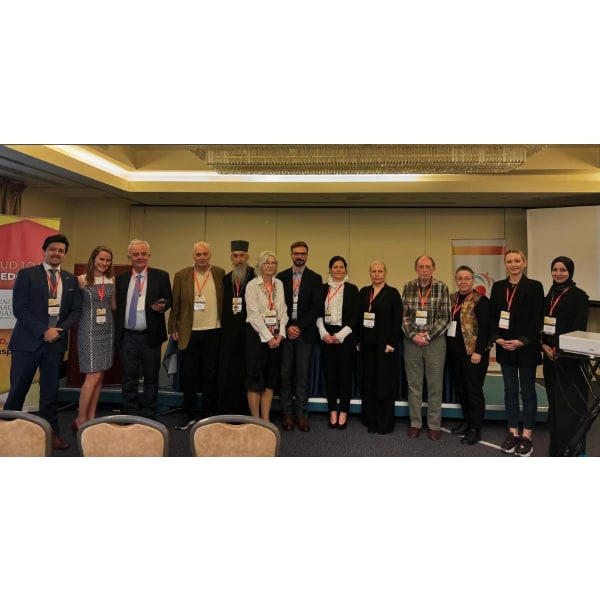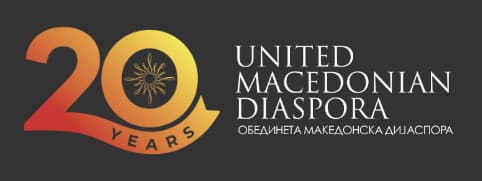
Photo of Forum speakers/moderators, minority representatives in Greece, and organizers
The United Macedonian Diaspora (UMD), the leading global nonpartisan, nonpolitical, nonprofit organization advocating for Macedonians, partnered with the Greece-based Macedonian Movement to Promote Mother Language NPO “Krste Misirkov” to host the 2nd Annual Thessaloniki (Solun) Human Rights Forum on October 19, 2024. This impactful event, held in Thessaloniki (Solun), Greece, sought to empower minority voices and promote human rights for all communities, focusing on collaboration, dialogue, and cultural preservation to address challenges facing minorities in the region. To date, over 120 human rights defenders, academics, and representatives of European linguistic and cultural groups have attended the Forum.
Opening Remarks
Archimandrite Nikodim Tsarknias, the religious leader of the Macedonian Orthodox community in Greece for over four decades, opened the forum by emphasizing the importance of events like these in advancing basic human rights and religious freedom. He expressed gratitude for UMD and Macedonians abroad, who have strengthened the voices of Macedonians in Greece. He thanked the diaspora for supporting the Sveta Zlata Meglenska Macedonian Orthodox Church in Aridaia (S’botsko), the only church in Greece to offer weekly services in Macedonian. He shared his hope for the day when the Greek state allows full registration of the church as a faith-based community.
Dr. Kristina Bundra, UMD Secretary and Board Member, who traveled from the United States to open the forum, stated, “It is inspiring to see so many communities come together with a shared vision. This forum demonstrates that when we unite beyond borders and pursue common objectives, we can create a brighter future for all, promoting human rights and dignity for minorities everywhere.”
UMD Macedonia and Europe Director, Gordan Jordanov, echoed these sentiments, adding, “Our collective efforts today demonstrate the strength of unity among our communities. Together, we can forge a path toward recognizing and protecting our rights and identities, with solidarity as our foundation.”
Panel 1: Addressing Historical Divisions and Current Challenges
The first panel focused on the historical struggles of minority groups in Greece and the broader Balkan region. Professor Nikola Zezov emphasized the need for open dialogue and mutual understanding to improve Macedonian-Greek relations and achieve recognition for the Macedonian minority. “Restoring trust and improving relations, beyond the limitations of the Prespa Agreement, will require a sincere commitment to equality,” he noted.
Emine Palazli, representing the Turkish minority, highlighted the violations her community faces, including restrictions on education and the closure of cultural associations. “These actions undermine our rights and identity,” she stated.
Sotiris Bletsas, an advocate for Aromanian/Vlach rights, underscored his community’s desire to protect its culture, saying, “Greece assumes minorities have territorial pretensions, but we simply want to preserve our language and heritage while remaining proud Greek citizens.”
This panel, moderated by Mario Hristovski—known for his YouTube series “Mario’s History Talks” on Macedonian history and traveled from the United States to attend—brought out the region’s ongoing challenges in recognizing minority rights, spotlighting the need for mutual understanding in the face of historical complexities.
Panel 2: Education and Cultural Preservation as Pathways Forward
The second panel turned to education and cultural preservation as essential avenues for strengthening minority communities.
Dr. Hywel Glyn Lewis from the UK discussed parallels with the Welsh experience, noting the systematic challenges Welsh speakers face and the UK’s history of threatening the Welsh language. His insights highlighted the crucial role of language preservation for cultural survival.
Sabrina Rasom from Italy’s Ladin Cultural Institute reinforced this message, explaining how cultural centers and events instill pride in young people, particularly those of diverse backgrounds, allowing them to connect with their heritage and peers.
Elena Prvulescu, a Macedonian representative from Romania, underscored the benefits of political inclusion for minority groups. “Romania’s recognition of its minorities has fostered greater understanding and cohesion,” she stated, advocating for similar policies in Greece.
Pervin Hayrullah, of the Western Thrace Turkish minority, stressed, “There is an urgent need for collaboration and the promotion of bilingualism to preserve our community.”
This panel was moderated by Gordan Jordanov, who emphasized the role of education and youth engagement in building a shared future.
A Call for Action and Unity
The forum concluded with the signing of a resolution and action plan, representing the united commitment of Macedonian, Turkish, Aromanian/Vlach, Albanian, and Jewish minorities in Greece. The resolution called on the Greek government to adopt inclusive policies, enhance educational opportunities, and support cultural preservation to foster a more equal and respectful society. Representatives of the Albanian and Jewish minorities in Greece were invited to the Forum, but they did not participate.
The action plan included advocating for the legal recognition of Macedonian, Turkish, Aromanian/Vlach, Albanian, and Jewish minorities in Greece to protect their cultural and linguistic rights. It also outlined the need for anti-discrimination laws across public services, education, and employment sectors, along with promoting minority cultures through educational reforms, media representation, and public events. The action plan includes calling on EU institutions and international human rights bodies to apply diplomatic pressure on Greece. Additionally, public awareness campaigns will highlight minority struggles and cultural festivals and forums will be organized to foster intercultural dialogue. Working groups will be established to address specific needs in these areas, ensuring meaningful research and progress.
Moving Forward: A Shared Vision for Equality
The 2nd Thessaloniki (Solun) Human Rights Forum was a powerful step toward fostering unity and understanding among Greece’s diverse communities. By addressing historical injustices and proposing collaborative solutions, the forum laid a strong foundation for continued dialogue and action. As Dr. Bundra concluded, “The commitment we’ve seen today reaffirms the importance of solidarity in the pursuit of human rights and dignity for all.”
UMD extends heartfelt gratitude to its members and partners, especially the Macedonian Movement to Promote Mother Language NPO “Krste Misirkov”, Archimandrite Nikodim Tsarknias, and Eugenia Natsoulidou, for their support in making this event possible.
The 2nd Thessaloniki (Solun) Human Rights Forum cost approximately €11,000 to organize. UMD funds this annual event through generous donations from Macedonians worldwide via our Macedonian Human Rights Fund. To help us continue providing a safe and empowering platform for human rights defenders in Greece, please consider supporting our efforts by donating HERE.
Photos and videos from the forum can be found on UMD’s social media and YouTube channel.




